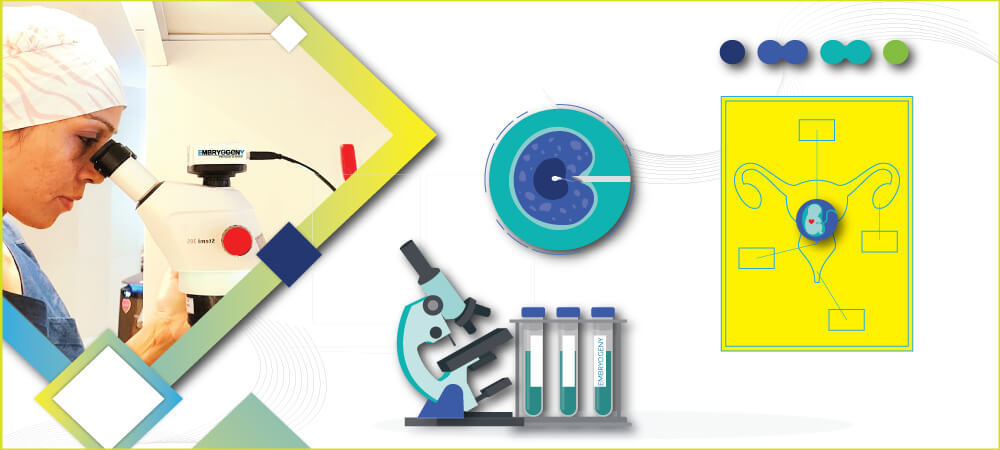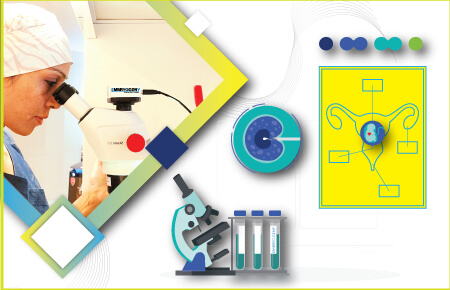

What does an Embryologist do ?
An Embryologist is a biologist who takes meticulous care of human gametes (both eggs and sperms) during the entire time they are outside the human body. Job of an Embryologist is to maintain anything and everything in the IVF and Andrology lab so that the culture condition within the IVF lab helps the oocytes and sperms to fertilize and grow into healthy emrbyos that can be safely transferred back to the uterus.
What is the minimum qualification or eligibility to become an Embryologist ?
According to the latest ART (Assisted Reproductive Technology) Rules released in March 2022, eligibility criteria for becoming an Embryologist is:
Any post graduate in Clinical Embryology – M.Sc. Clinical Embryology from a recognized University (Full time program with minimum 4 semesters) with at least three years of human ART lab experience.
OR
Ph.D. holder in subject related to Clinical Embryology or ART from recognised university with atleast one year experience of human ART lab and gamete handling.
OR
MBBS or Veterinary graduate with post graduate degree in Clinical Embryology from recognised university with additional two years experience in ART lab.
OR
Post graduate in Life sciences or biotechnology with minimum one year full time Clinical Embryology Certified Training and atleast four years of experience in handling human gametes and embryos in a registered ART level 2 Clinic.
How to become an Embryologist ?
Check if you fulfil the minimum qualification criteria for becoming an Embryologist. If you do so, you may join a full time certificate course offered by many leading training centres. Once you complete your hands-on certificate course in Embryology you may join any ART Level 2 Clinic (IVF Clinic) as a junior embryologist and train under a senior embryologist until you can perform the tasks on your own. This usually takes about a year or two.
What is the skill requirement for becoming an Embryologist?
The main skills and some competencies that you need for becoming an Embryologist are:
• Attention to details
• Perfection
• Patience
• Stamina for long hours of microscopy
• Good hand eye co-ordination to smoothly perform micromanipulation
• Steady hands
• Fair amount of mobility
• Flexibility to work over the weekends.
• High ethical values
• Punctuality
• Ability to upgrade one’s knowledge by participation in academic events
• Ability to enjoy monotonous work without getting bored.
• Ability to prioritize
• Ability to improvise
Unlike any other job, Embryology should not be chosen keeping the short term gain in focus. In the short run, embryology may not fetch you as much financial gain as some of your selective friends, but in the long run, Embryology is very satisfying. It gives you purpose in life.

What is the salary of an Embryologist ?
The salary range of a junior embryologist is around 30 k to 45 k depending on the current level of experience as well as metro or non metro city. Salary of senior embryologist starts from 50k and can be as high as 1.5 Lacs.
The salary of a lab director starts from 1L to 2Lacs. Salaries in Embryology are usually distributed over a large range because it is dependent on many factors like experience, the city in which the IVL Lab is placed and the number of cases the IVF Clinic does per annum.
What is the typical working hour for an Embryologist ?
An embryologist usually works 8 to 9 hours a day and the working hours depends on what time the Ovum Pickups are planned. Typically a lab that operates in mornings, the working hours of an Embryologist could be from 9:30 AM to 5:30 PM. However, an Embryologist often needs to work on weekends. Weekend work is usually for limited number of hours though.
An Embryologist cannot plan sudden leaves as the Embryology lab cannot be left unattended even for a single day.
Embryology is a job that needs total commitment and responsibility. Anyone looking to work in a casual type of job which is not so time bound, should not think about practicing Embryology.
What is the career progression for an Embryologist ?
Typically an Embryologist joins in any IVF centre as a junior Embryologist and over the years progresses to be a Senior Embryologist and finally a Lab Director. The progression is usually slow and is completely dependent on the skillset and adaptability of the Embryologist.
The job profile of an Embryologist can be divided into three profiles, all these profiles have overlapping tasks and there is usually no clear demarcation between any two profiles. The career progression of an Embryologist is subtle and takes years of practical practice and experience to graduate to the next level.
What is the job profile of a Junior Embryologist ?
They are the backbone of any IVF Clinic, who perform everyday mundane tasks that help maintain a sterile environment within the IVF Lab. Some of the jobs that a junior Embryologist performs are:
• Equilibration of media in Culture plates
• Preparing the IVF lab for ovum pickup
• Preparation of IVF and IUI Semen Sample
• Oocyte screening
• IVF insemination
• Handling Culture dishes
• Fertilization checks and Embryo / Blastocyst Grading
• Daily temperature checks of all heated surfaces
• Daily checks on CO2 and Trigas levels and pressure
• Cleaning and QA / QC of the entire IVF Lab
• Maintaining the Liquid Nitrogen dewars
• Record keeping for all IVF cases
• Double witnessing the IVF procedures
• Perform Semen Analysis , Semen Cryopreservation and Sperm Function Tests like DFI, HOS etc.

What does a Senior Embryologist do ?
As you progress through your career as a Junior Embryologist, over the years one gains experience to handle the oocytes and sperms and understand minute differences in culture environment. The next level is to try and achieve best success rate by preparing for each IVF case and decide what culture strategy, method of fertilization and what IVF / ICSI protocol will be used for each patient to maximize patient success rate per cycle.
This needs not only knowledge of gametes, but also knowledge of human reproduction and how the IVF stimulation protocols work. In order to graduate to the next role, it is important that the Embryologist keeps themselves updated with the basics of cell biology , molecular biology, embryology, human reproduction apart from knowing the latest in the field of ART.
Some of the tasks that a Senior Embryologist performs are:
• Individualize Culture strategy / Fertilization method etc. for each IVF patient.
• Plan the next day cases in IVF lab so that the types of culture dishes, number of culture dishes and media can be optimized based on available incubator space.
• Study patient history and previous IVF result to suggest if any add-ons are needed for current cycle.
• Perform ICSI with ease.
• Perform embryo grading and assessment and choosing the right embryo for transfer / vitrification etc.
• Perform Warming and Vitrification of embryos, oocytes and blastocysts with ease.
• Perform embryo biopsy for pre-implantation genetic testing (PGT) with ease.
• Ensure QA / QC of IVF lab occurs as per schedule to ensure required air quality and culture conditions.
• Regular servicing, calibration and cleaning of IVF lab equipment like incubators, Laminar air flows, micromanipulator, microscopes, air filters etc.
• Manage and maintain inventory of IVF lab consumables and disposables.
What is the job of IVF Lab Director ?
Over and above the role of a senior embryologist, an IVF lab director usually performs the following tasks:
• Provide infrastructure to record Key performance areas (KPI)’s of an IVF lab. Review the KPI’s at regular interval to check deviations and drift from benchmarks.
• Perform risk analysis in case of drift and deviation and decide the needed steps of correction in future cycles.
• Study patient history of patients who have had multiple IVF failures to understand what adjuncts can be added for them to improve their IVF success rate.
• Participate in CME’s and keep themselves upto date with latest technologies in IVF. Choose the learnings from the gathered knowledge to improve the success rate of IVF Lab.
• Assess try new equipment and or software for the IVF lab to improve IVF Lab performance or improve the workflow.
How is Embryology as a career ?
Embryology is a very demanding job and needs total commitment to the IVF Lab. It is not a casual job that one can do for just passing time. It is not a job that can be done remotely. It is a very demanding job that give you equal amount of satisfaction.
What is the future scope for Embryology in India ?
India has about 3000 ART and Surrogacy Clinic’s that are registered as ART Level 2 Clinics. Out of these about one third or less of the clinics have full time Embryologist. About two thirds smaller establishments, still rely on visiting Embryologist and perform batch IVF due to lack of trained Embryologist in these cities. As of today it leaves about 1000 such Clinics who would want to hire one trained junior Embryologist right away.
There are not many colleges in India that offer M.Sc. in Clinical Embryology, nor are there many certified training institutes in non metro cities, this leaves a huge gap in training embryologists on practical aspects.
We predict that over the next few years there will be huge demand in hiring trained Junior Embryologist. However if we get more and more universities to open up masters in Clinical Embryology, then over five years, the demand may saturate unless we see an exponential rise in IVF Clinics.
What are the accreditation bodies who accredits an Embryologists?
There is no accreditation body in India, that provides accreditation to Embryologist in India. However ESHRE (European Society of Human Reproduction and Embryology) as well as ASRM (American Society for Reproductive Medicine) are two such international bodies that accredits Embryologist’s worldwide.
ESHRE is a very prestigious body that provides international certification to Clinical Embryologists. The exam for ESHRE Certified Clinical Embryology as well as ESHRE Certified Senior Clinical Embryologist is usually held every year during the annual ESHRE meet around the month of June every year. It is a very prestigious exam and requires fair amount of knowledge in Embryology as well as human reproduction to clear the exam.
ASRM also provides on demand online modules for Certification in Clinical Embryology.
What is the benefit of getting accredited as Embryologist by international bodies like ESHRE ?
The first step towards embryology is to master the skill to the Tee. Then comes the need to understand every aspect of human reproduction , cell biology, molecular biology and genetics in order to provide results consistently. Accreditation bodies like ESHRE test an embryologist at all fronts and accredit only the most robust ones. ESHRE certification are like stepping stones to higher achievement in career progression of an Embryologist.
Is there any point in doing certificate course for hands on training in Embryology ?
Job interview for Embryologist in India is still not as elaborate at many centres. When such centres receive multiple application for the post of junior embryologist, having a hands-on training certificate from reputed teachers and course directors might give you an edge over the others who do not have such training experience.
